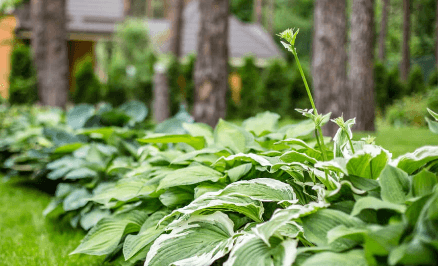The Ultimate Guide to Choosing the Best Fertilizer for Hostas

Welcome to the ultimate guide on choosing the best fertilizer for hostas! If you’re a proud hosta gardener, then you know how important it is to keep these beautiful plants thriving and flourishing. And one of the key secrets to their success lies in finding the perfect fertilizer that meets their unique needs. But with so many options out there, how do you know which fertilizer will give your hostas the nourishment they crave? Don’t worry – we’ve got you covered! In this comprehensive guide, we’ll walk you through everything you need to know about fertilizers for hostas. From understanding different types of fertilizers to tips on maintaining a healthy hosta garden, we’ve got all the information right here. So grab your gardening gloves and let’s dive into the world of fertilizers as we unlock the secrets to growing vibrant and resilient hostas like never before! Read more
What is a Fertilizer?
What is a fertilizer, you may ask? Well, simply put, it’s like giving your hostas a delicious and nutritious meal. Just as we need food to stay healthy and strong, plants also require essential nutrients to thrive. Fertilizers are formulated with a combination of these nutrients that provide the necessary nourishment for your hostas. There are different types of fertilizers available on the market. Organic fertilizers contain natural ingredients such as compost or manure, while synthetic fertilizers are made from chemical compounds. Both types have their advantages and disadvantages, so it’s important to choose one that aligns with your gardening preferences. When selecting a fertilizer for your hostas, consider the three primary macronutrients: nitrogen (N), phosphorus (P), and potassium (K). Nitrogen promotes leafy growth; phosphorus supports root development and flower production; potassium helps strengthen overall plant health. Learn more
It’s crucial to understand how much of each nutrient your best fertilizer for hostas require at various stages of growth. This information can usually be found on the fertilizer packaging in the form of an N-P-K ratio. For example, if you see 10-5-5 on the label, it means there is 10% nitrogen content relative to 5% phosphorus and potassium respectively. Remember that choosing the right fertilizer goes hand-in-hand with understanding your soil conditions too! Conducting a soil test will help identify any deficiencies or imbalances in nutrients present in your garden bed. Armed with this knowledge alongside knowing what type of fertilizer suits your needs best will ensure you’re providing optimal care for those lovely hostas!
Types of Fertilizers
When it comes to best fertilizer for hostas there are several types of fertilizers you can choose from. Each type has its own benefits and considerations, so it’s important to understand the options before making a decision.
- Organic Fertilizers:
- These fertilizers are derived from natural sources such as compost, manure, or plant-based materials. They release nutrients slowly over time and improve soil health in the long run. Organic fertilizers are environmentally friendly and safe for use around children and pets.
- Synthetic Fertilizers:
- These fertilizers are manufactured using chemical compounds that provide immediate nutrient availability to plants. They typically contain higher concentrations of nitrogen, phosphorus, and potassium (NPK) compared to organic options. Synthetic fertilizers should be used carefully to avoid overapplication and potential harm to the environment.
3. Slow-Release Fertilizers:
As the name suggests, slow-release fertilizers gradually release nutrients into the soil over an extended period. This ensures a steady supply of nutrients for your hostas without the risk of burning or leaching excess fertilizer. Read more
Liquid Fertilizer:
Liquid fertilizer is a concentrated solution that can be diluted with water before application directly onto your hostas’ foliage or root zone. These liquid formulations offer quick absorption rates and may be more suitable for foliar feeding or providing an instant nutrient boost. Read more
Granular Fertilizer:
Granular fertilizer consists of small pellets or granules that can be spread evenly around your hostas. They tend to have slower release times than liquid forms but offer convenience when it comes to application. Remember that choosing the right fertilizer depends on various factors such as soil composition, climate conditions,and specific nutritional needs. Hostas generally prefer a balanced NPK ratio (e.g., 10-10-10) along with micronutrients like iron,zinc,and magnesium. Be sure also consider any special requirements based on the variety of hostas you have. So, take some time to research and Tips for Maintaining a Healthy Hosta Garden
- Provide Adequate Water:
- Hostas thrive in moist soil, so it’s important to water them regularly, especially during dry spells. Aim to keep the soil consistently moist but not waterlogged.
- Mulch Wisely:
- Applying a layer of organic mulch around your hostas can help retain moisture in the soil and suppress weeds. Use materials like wood chips or shredded leaves, making sure to leave space around the base of each plant to prevent rot.
3. Avoid Overcrowding:
Give your hostas room to grow by spacing them adequately apart. Crowded plants are more susceptible to diseases and pests, as well as having limited access to nutrients and sunlight.
- Regularly Remove Dead Leaves:
- As hosta leaves die back throughout the season, be sure to remove them promptly. This helps prevent disease spread and keeps your garden looking tidy.
- Protect from Slugs:
- Slugs are notorious pests that love feasting on hosta foliage. To protect your plants, use natural deterrents like crushed eggshells or diatomaceous earth around their bases.
- Fertilize Appropriately:
- Apply a balanced slow-release fertilizer once or twice a year according to package instructions for optimal growth and health.
- Monitor for Pests and Diseases:
- Keep an eye out for common issues such as aphids, snails, fungal infections, or leaf spot disease early on so you can take necessary action before they cause significant damage. Remember that every garden is unique; therefore it’s essential to observe your specific conditions closely and adjust these tips accordingly!
Conclusion
In the world of hosta gardening, choosing the right fertilizer is essential for ensuring healthy and vibrant plants. We’ve covered everything from what fertilizers are to how to choose the best one for your hostas, as well as when and how to apply it. Additionally, we shared some tips for maintaining a thriving hosta garden.
By understanding the different types of fertilizers available and their specific nutrient compositions, you can make an informed decision about which one will best meet your best fertilizer for hostas needs. Remember to consider factors such as soil type and pH levels when selecting your fertilizer. Applying fertilizer at the appropriate times throughout the growing season will provide ongoing nourishment for your hostas. Be sure to follow package instructions regarding application rates and frequency.
Maintaining a healthy hosta garden goes beyond just using fertilizer. Keep in mind that proper watering, adequate sunlight exposure, regular pruning of dead leaves or flowers, and controlling pests are all important aspects of caring for your plants. Creating optimal conditions for your hostas will lead to beautiful foliage displays year after year!
FAQs
Q: Can I use any type of fertilizer for my hostas?
A: While there are many fertilizers available on the market, not all of them are suitable for hostas. It’s important to choose a fertilizer specifically formulated for these plants to ensure they receive the nutrients they need.
Q: How often should I fertilize my hostas?
A: Hostas generally benefit from regular fertilization throughout the growing season. It is recommended to apply fertilizer every four to six weeks during this time. However, be sure not to over-fertilize as it can lead to excessive leaf growth and weaken the overall health of your plants.
Q: Is organic or synthetic fertilizer better for hostas?
A: Both organic and synthetic fertilizers can provide adequate nutrition for your hostas. The choice between the two ultimately depends on personal preference and gardening practices. Organic options may offer long-term benefits by improving soil quality, while synthetic fertilizers tend to provide quick-release nutrients.
Q: Can I use compost as a fertilizer for my hostas?
A: Yes, compost can be an excellent source of nutrients for your hosta plants. Incorporating well-rotted compost into the soil when planting or applying it as a top dressing in spring can help improve soil fertility and support healthy growth.
Q: What should I do if my hosta leaves turn yellow?
A: Yellowing leaves in hostas can indicate various issues such as nutrient deficiencies, overwatering, poor drainage, or pest infestations. Assess the situation carefully by checking moisture levels, inspecting roots for rot or pests, and considering whether additional feeding might be necessary using an appropriate balanced fertilizer.a




